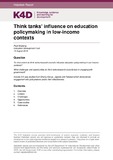Think Tanks’ Influence on Education Policymaking in Low-Income Contexts
Abstract
Though think tanks are acknowledged as critical partners bridging research with policy formulation, one significant challenge that almost all think tanks face is measuring and demonstrating their effectiveness and influence. Whilst their engagement might be visible in public discourse, think tanks’ direct impact on policy is somewhat limited. Many ideas generated by think tanks, even when adopted as government policy, are rarely credited as such. Even in instances where think tanks’ ideas seem to have influenced policy change or processes, the timing of such decisions by policymakers often suggests that larger political forces are driving the agenda. In addition to measuring impact, think tanks face a number of challenges which impinge on their operational and organisational capacity and therefore their ability to engage and influence policymakers and other end users of their outputs such as the general public. These challenges include: financing, autonomy and integrity, changes in political and economic environments, relevance, staff capacity, quality and overall sustainability. Notwithstanding, there are a number of potential opportunities for think tanks to increase their efficacy. These include: exploring alternative funding routes, co-creation and genuine partnership with government and other end users of their research/policy outputs, establishing regional/continental think tank networks, making research accessible using technology and other means, creating strategic plans, designing a creative and proactive research agenda, developing a pipeline for early career researchers and collaboration with universities and other research institutions to strengthen influence. There is great interest in collaboration between universities and think tanks and when collaborating under mutually beneficial terms, partnership has resulted in strong engagement with decision makers. This interest in collaboration is not only among the institutions themselves but extends to the individuals working in them as well as the organisations that use and fund policy research, training, policy dialogue and consultancy. Potentially useful synergies between both types of institutions include improved quality of research outputs and training, networking, increased visibility, financial gains and capacity building.
Citation
Boateng, P. (2018). Think tanks’ influence on education policymaking in low-income contexts. K4D Helpdesk Report 406. Brighton, UK: Institute of Development StudiesIs part of series
K4D Helpdesk Report;406Rights holder
© DFID - Crown copyright 2018.Collections
- K4D [937]

